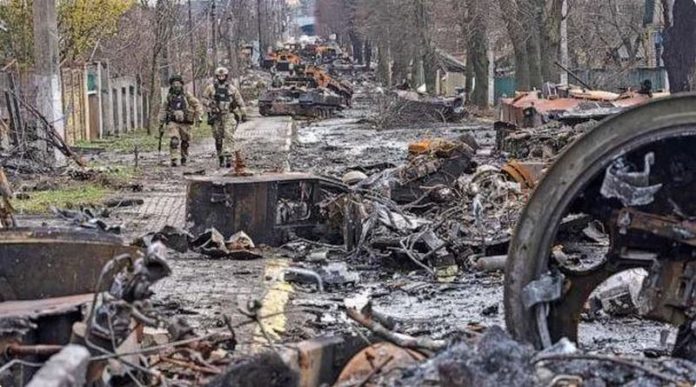
The war in Ukraine is entering an “attritional” phase which could last several months, ministers were warned today.
Boris Johnson told the weekly Cabinet meeting Ukraine’s position remained “perilous” – with Russian President Vladimir Putin “angered by defeats but determined to claim some sort of victory regardless of the human cost”, the Prime Minister’s spokesman said.
The Cabinet was briefed by a senior national security official who, according to the PM’s spokesman, told them: “Putin was focusing his attention on Donbas region and that the next phase of the war was likely to be an attritional conflict which could last several months.
“ Russia would aim to exploit its troop number advantage but Ukraine had already shown this was unlikely to be decisive on its own.
“There were some signs Russia had not learned the lessons from previous setbacks in northern Ukraine and there was evidence of troops being committed to the fight in piecemeal fashion.
“Reports of poor Russian morale continued, with claims that some soldiers and even units were refusing to fight.”
Chief of the Defence Staff Admiral Sir Tony Radakin told ministers allies were “expanding military aid to Ukraine and the UK continued to play a leading role,” the spokesman said.
Defence Secretary Ben Wallace is expected to update the Commons on sending fresh supplies to the Ukrainians this week.
Lieutenant General Lance Landrum, deputy chairman of the military committee at NATO headquarters in Brussels, said allies were sending heavier hardware.
“We have seen an increase in heavier type weapons, defensive weapons, to help them in their fight, particularly in the east as the fighting escalates in the east,” he said at the Invictus Games in The Hague.
He added: “What we’ve seen is a huge fighting spirit from the Ukrainian forces.
“We’ve seen them be creative, and we’ve seen innovation and we’ve seen a lot of courage.
“They know their home terrain and they’re fighting for their homes and their own families, and their own citizens.
“I think that that spirit is something that is really unpredictable from an adversary’s point.
“I think maybe they were underestimated. There has been some support from outside nations, but the fighting spirit of Ukraine has really saved the day for them, and we are with them as they continue the fight in the east.”
Earlier, former UK Joint Forces Command chief General Sir Richard Barron, who briefs MPs later, said Kremlin troops had “learned some lessons from the first 54 days of this war” as
Russia launched the Battle of the Donbas.
But he added: “Their morale won’t be any stronger from the battering they have had.
“The Ukrainians should be very confident, if they are in well-prepared, defensive positions.”
Ukrainian President Volodymyr Zelensky warned a “very large part of the entire Russian army is now focused on this offensive,” pledging: “No matter how many Russian soldiers are driven there, we will fight, we will defend ourselves. We will do it every day.”
Former UK Joint Forces Command chief General Sir Richard Barrons today told the Commons Defence Select Committee Putin’s “goals have changed because of the fundamental lack of success in the military campaign to date”.
He told MPs: “The original objectives were assessed to be to remove the regime in Kyiv, to dismantle the Ukrainian military so that Ukraine represented no military threat at all to Russia and to secure, at least, the full extent of the Donbas.
“It has become clear that he can’t remove, currently, the regime in Kyiv, he’s a very long way away from dismantling the military and he’s still embarked on trying to seize the Donbas.”
Ukraine needs heavy artillery from Western allies to help it resist invaders, he said.
But he predicted a stalemate in the eastern region bordering Russia within weeks.
“More likely than not this battle dissolves into some sort of stalemate – nobody has won and nobody has lost and nobody is going anywhere,” he said.
“Stalemate may occur by late spring which no-one knows how to unstick.
“In those circumstances we will have choices to make but we would be supporting an insurgency, we will be supporting the resistance on what will have become some sort of line of demarcation, where there is a ceasefire or not.”
Raising the spectre of a new Cold War between Russia and the West, Gen Sir Richard warned: “We are now clearly looking at a confrontation for the rest of this century, I think, in which we are going to have to stand up for our security, our prosperity and our values in ways we have not had to do for a generation.”
But he feared NATO was not ready to intervene in Ukraine, even if Kremlin troops took the capital.
“At which point we will have a call to make and that call would be easier if we had made any preparations at all to act in those circumstances at the speed required – and frankly we have not,” he added.
“The main reason that we are keen to avoid a war between Russia and NATO is that NATO isn’t ready, and one should be ashamed of that.”
